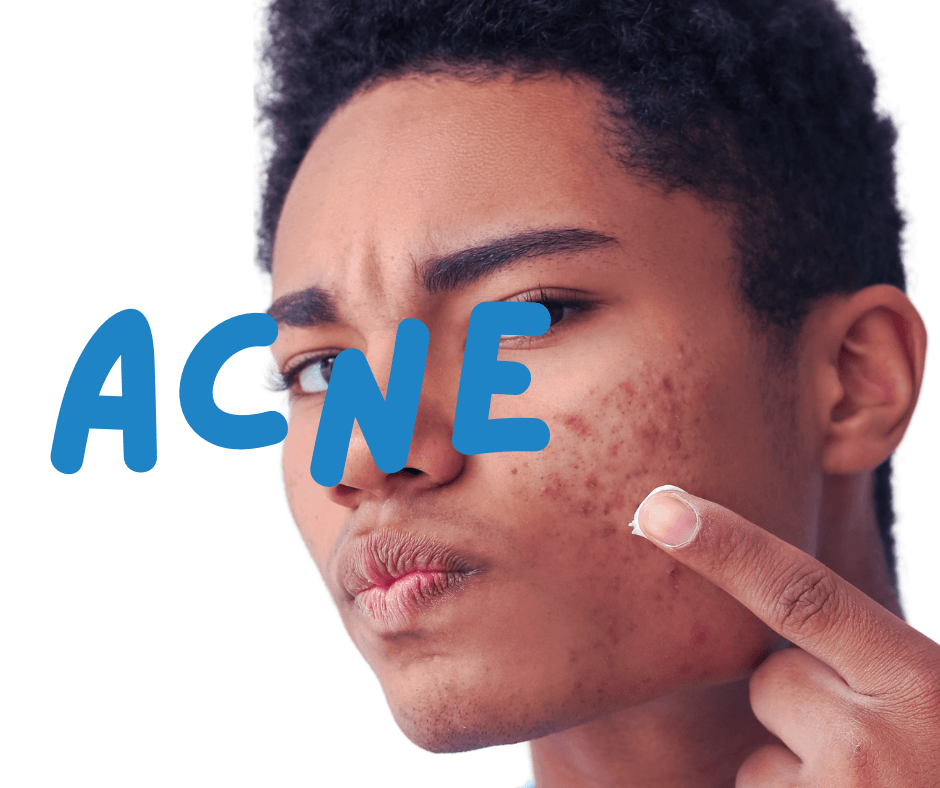Acne is a common skin condition that occurs when hair follicles become clogged with oil (sebum), dead skin cells, and sometimes bacteria. This leads to outbreaks of lesions, commonly called pimples. It typically presents as whiteheads, blackheads, pimples, and cysts. Acne is most common during adolescence due to hormonal changes but can affect people of all ages.
Types of Acne:
- Comedonal Acne: Characterized by blackheads and whiteheads. This type forms when pores are clogged but not infected.
- Inflammatory Acne: Pimples or pustules caused by bacterial infection, often accompanied by redness and swelling.
- Cystic Acne: Consists of deep, painful cysts and nodules, can lead to scarring.

Causes and Risk Factors:
- Hormonal Changes: Androgens increase oil production, which is why acne is common during puberty, menstruation, pregnancy, and in conditions like polycystic ovary syndrome (PCOS).
- Genetics: A family history of acne increases your likelihood of developing it.
- Diet: Some studies suggest that sugary foods and dairy may contribute to acne, but the connection isn’t entirely clear.
- Stress: While stress doesn’t cause acne, it can worsen it by increasing inflammation and oil production.
- Cosmetics: Oily or greasy products can clog pores.
Treatment Options offered on Online Doctor SA:
-Tretinoin Cream 0.05% (e.g. Retin-A/Ilotycin/Retacnyl)-
Tretinoin cream is a well-documented, effective option for acne treatment.
- How it works:
- Increased Cell Turnover: tretinoin cream stimulates the shedding of old, dead skin cells and promotes the growth of new ones, keeping pores clear and preventing clogged pores that lead to acne.
- Anti-inflammatory Effects: tretinoin cream can reduce inflammation, making them helpful in treating inflammatory skin conditions like acne.
- Reduction in Sebum Production: tretinoin cream can reduce the amount of oil produced by sebaceous glands, which is beneficial in treating severe acne.
- Common Side Effects
- Irritation and Dryness: Dryness, peeling, redness, and irritation are common in the initial stages, often referred to as the “retinoid reaction.” This typically subsides as the skin adjusts.
- Sun Sensitivity: tretinoin cream can make the skin more susceptible to sunburn, so it’s crucial to apply broad-spectrum sunscreen daily.
-Doxycycline (Acne antibiotic tablet)-

Doxycycline is an effective oral antibiotic for treating moderate to severe inflammatory acne. It works by reducing bacteria and inflammation in the skin. While it is generally well-tolerated, side effects such as gastrointestinal discomfort and sun sensitivity are common. It should be avoided in pregnant women.
Improvement in acne may be seen after a few weeks of consistent use, but treatment for 3 months is usually required to fully clear the skin.
It’s often combined with topical treatments like tretinoin cream for more effective results.
-Other available acne treatment options-
- Zineryt:
- Zineryt is a topical solution combining the antibiotic erythromycin with zinc acetate, used to treat mild to moderate inflammatory acne. It works by reducing bacteria and inflammation. Side effects are usually mild and include skin dryness and irritation.

- Epiduo & Epiduo forte:
- The combination of adapalene and benzoyl peroxide makes Epiduo a powerful acne treatment because it targets multiple aspects of acne:
- Adapalene accelerates the shedding of dead skin cells, preventing them from accumulating and clogging pores.
- Benzoyl peroxide eliminates acne-causing bacteria on the skin, reducing the risk of infected pimples.
- Both ingredients have anti-inflammatory properties, which reduce redness, swelling, and irritation.
- By regulating cell turnover and reducing bacterial growth, Epiduo helps prevent future acne lesions from forming.
- The combination of adapalene and benzoyl peroxide makes Epiduo a powerful acne treatment because it targets multiple aspects of acne:

- The key difference between Epiduo and Epiduo Forte is the concentration of adapalene:
- Epiduo: Contains 0.1% adapalene and 2.5% benzoyl peroxide.
- Epiduo Forte: Contains 0.3% adapalene (three times the concentration in regular Epiduo) along with the same 2.5% benzoyl peroxide.
- Differin:
Differin (adapalene) is a retinoid-based topical treatment for mild to moderate acne. It works by increasing skin cell turnover, preventing clogged pores, and reducing inflammation. While it can cause initial irritation and purging, these effects generally subside with continued use. For best results, consistent daily application along with moisturizer and sunscreen is key.

- Treclin:
- Treclin is a powerful topical acne treatment that combines low strength tretinoin cream (0.025%) with the antibiotic clindamycin. It is primarily used for moderate to severe acne and works by reducing clogged pores, killing acne-causing bacteria, and controlling inflammation. Although it is effective in treating both comedonal and inflammatory acne, Treclin can cause dryness and irritation, particularly during the early stages of treatment. Consistent use, along with a good skincare routine that includes moisturizer and sunscreen, is key to managing side effects and achieving clear skin.

- Clindoxyl:
Clindoxyl is a topical acne treatment combining clindamycin and benzoyl peroxide, making it effective for treating mild to moderate inflammatory acne. It works by reducing acne-causing bacteria, preventing clogged pores, and calming inflammation. While effective, it can cause side effects like dryness, redness, and peeling, especially in the early stages of use. The addition of benzoyl peroxide helps minimize the risk of antibiotic resistance. To get the best results, use Clindoxyl consistently, along with a moisturizer and sunscreen.


